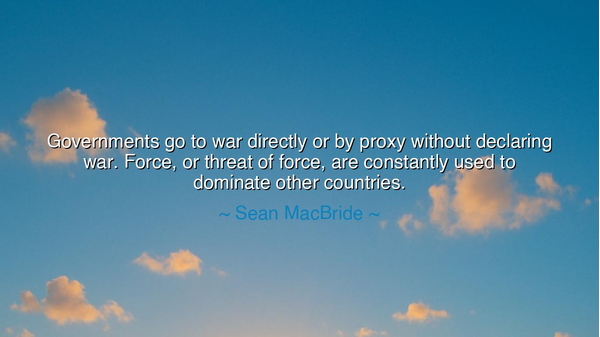
Governments go to war directly or by proxy without declaring
Governments go to war directly or by proxy without declaring war. Force, or threat of force, are constantly used to dominate other countries.






Hear, O children of justice, the voice of Sean MacBride, Nobel laureate and warrior for peace, who declared: “Governments go to war directly or by proxy without declaring war. Force, or threat of force, are constantly used to dominate other countries.” In these words he unveils a harsh truth of our age: that conflict no longer wears the formal robes of declaration, but creeps in silence, through hidden hands and veiled threats. What once was announced with drums and proclamations is now carried out in the shadows, disguised as necessity, influence, or security.
The origin of MacBride’s warning lies in the dark heart of the twentieth century, when empires and superpowers, weary of open wars, turned instead to proxy wars. In Korea, Vietnam, Afghanistan, and across Africa and Latin America, nations poured arms, gold, and advisors into battles fought not in their own names, but through others. Soldiers of small countries bled and died, while the great powers pulled the strings. War without declaration became the way of the world, and domination without accountability became its fruit.
Consider the Cold War, a struggle that defined MacBride’s time. The United States and the Soviet Union, fearful of nuclear annihilation, rarely struck each other directly. Instead, they armed factions, funded coups, and trained militias in distant lands. In Chile, elected leaders were toppled. In Afghanistan, rebels were armed to bleed the enemy. In Vietnam, millions perished in a war declared in no formal sense, but waged with full ferocity. Thus MacBride speaks truly: war is no longer the march of armies across borders, but the ceaseless application of pressure, force, and fear.
But let us remember also the threat of force, which can be as destructive as its use. When powerful nations sail fleets to foreign coasts, when missiles are paraded, when sanctions are wielded like weapons, they dominate without firing a shot. The weaker nation bends, its sovereignty diminished, its people silenced. This too is war, though no declaration is made. The history of the twentieth and twenty-first centuries is filled with such acts of intimidation—wars in all but name.
Yet MacBride’s words are not only a condemnation, but a summons to awareness. For if wars are fought in shadows, then citizens must become watchmen, vigilant against the deceit of governments who cloak aggression in the language of peacekeeping or stability. The people must demand truth: to call war by its name when force is used, to resist the corruption of language that seeks to disguise domination as diplomacy.
The lesson here is that war has changed its face, but not its essence. Whether declared or undeclared, whether fought by one’s own soldiers or by proxies, whether waged with bombs or with threats, war still consumes lives, corrodes trust, and diminishes freedom. To resist it requires wisdom, courage, and a relentless demand for accountability from those who govern.
Therefore, O children of tomorrow, let MacBride’s words be carved into your memory. Do not be deceived when rulers speak of “interventions,” “operations,” or “peacekeeping missions,” while sending others to kill and die. See clearly: war is war, whether clothed in honesty or disguise. Stand against the domination of the weak by the strong, and lift your voices for transparency, for restraint, for peace. For only by naming truth can we resist the shadow wars that shape our world, and only by courage can we end them.






HVChu Hong Van
This quote captures the hypocrisy of international relations perfectly. Nations claim to uphold peace while engaging in covert hostilities that achieve the same destructive ends. It makes me reflect on how fear is used as a political tool — the threat of force becoming as effective as force itself. Are we living in an age where psychological warfare has replaced traditional combat, and if so, what does that mean for humanity’s moral compass?
HNhoang nguyen
I find this observation both timeless and chilling. The idea that power can be exercised violently without formal war explains much of modern geopolitics. From military aid to puppet regimes, domination wears many masks. It’s unsettling how force has become an unspoken language of diplomacy. Maybe the question isn’t who’s at war — but who’s not, and whether peace is anything more than an illusion of restraint.
HGHuong Giang
What strikes me most about this quote is its moral clarity. MacBride refuses to let governments hide behind semantics. Calling something a ‘special operation’ or ‘defensive action’ doesn’t change its essence — it’s still violence for power. It makes me think: do citizens bear responsibility when their governments wage undeclared wars? Or are we complicit simply by accepting the comfort of not knowing?
TLTran Linh
This statement reminds me how blurred the line between war and peace has become. Nations use economic pressure, covert operations, and propaganda instead of bombs, yet the effects are just as devastating. I can’t help but question whether the world ever truly leaves wartime anymore. Perhaps the absence of declared wars isn’t a sign of peace, but proof that warfare has simply evolved into a permanent condition.
DHle dinh hieu
I think MacBride is exposing a truth most people prefer to ignore: that modern warfare often hides behind legal and political loopholes. Governments justify aggression as ‘defense,’ ‘stabilization,’ or ‘intervention.’ But isn’t that just rebranding domination? It’s frightening how normalized coercion has become. Maybe the real danger isn’t open war — it’s the quiet erosion of peace through constant threats and manipulation.